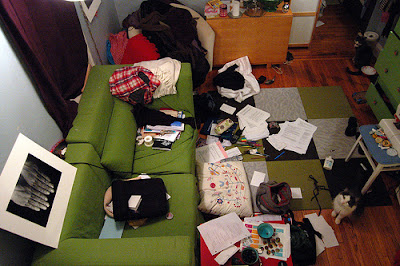
I'm starting a new series, where I'll walk through some of the organizing basics I cover with many of my clients.
One of the first steps is sorting through all the stuff, and deciding what to keep and what to discard. The idea isn't to take everything you own and shove it into plastic containers with labels! Determine what's really important to keep in your life, and let the rest go.
General Approaches
1. Start with a vision in mind. As Peter Walsh says in It's All Too Much, "Imagine the life you want to live."
2. Pick a place to start.
3. Ask yourself the right questions. (see also Questions to Help Eliminate Clutter)
4. Give yourself permission to let go.
5. Consider eliminating the shoulds: books you should read, etc.
6. And here's one more critical piece of advice: if sorting through everything feels overwhelming, recruit some help! Even professional organizers hire other professional organizers. But the right person to help you could be a neighbor or friend; maybe you can return the favor and help your helper do his or her own de-cluttering. It's generally best to have someone who has no emotional attachment to the stuff - a close relative is usually not the best choice. Look for someone who is compassionate, someone you can trust - and someone who will challenge you (in a nice way) if you seem to be making too few "this can go" decisions.
Working with someone else can keep you focused on the task and help you make good choices. (Example: You may want someone who can honestly say, "That outfit just doesn't do much for you." You probably already know that, but hearing it from someone else can still help.) And if you pick the right person it's just a whole lot more fun than sorting through it all on your own.
7. And no matter how tempting it is, don't discard someone else's stuff unless the person has given you permission to do so. You may think your partner needs to get rid of all sorts of things - but that's not your decision to make. Similarly, involve your children in sorting through the toys and deciding which to keep. (Yes, some children may be too young for this - but involve them as soon as possible.)
For specific types of items:
8. You may not need all the paper you have - in files, in piles to be filed, etc.
9. The sentimental stuff can be a challenge - save some of the sentimental, but be selective.
10. Clearing out the bookshelves is another one that's tough for lots of folks. It helps to allow yourself to give up on books you don't like.
11. You might let go of some magazines, too.
12. Consider whether you need all the owner's manuals you have.
[photo by Susan Tansil]
My teenage daughter has been helpful weeding out my wardrobe. I have been asking her about my iffy stuff. She has nixed almost all of it so far.
ReplyDeleteAnonymous, I'm glad your daughter has been helpful. Often family members are not the best helpers - but as you illustrate, sometimes they work out fine!
ReplyDelete